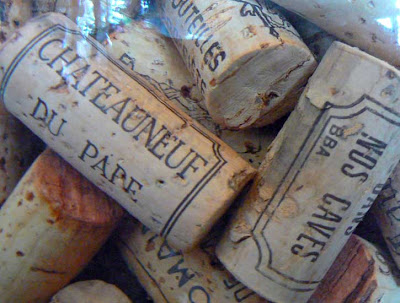Because we live in wine country, Ken and I buy most of our wine directly from local producers. We have four 10-liter containers that we take to the wineries where they are filled from the tank. Then we take the wine home, put it into bottles, and cork them.
We've collected bottles over time (it didn't take long) and we re-use them. But we need fresh corks every time we bottle. One of our local producers turned us on to the local grape growers' supply warehouse, kind of a Home Depot for wine makers. There we were able to buy a corker and, of course, corks.
 Now, you might think that buying corks is easy. Mais non ! There are all kinds of "closures" available in a wide range of sizes, materials, and quality. Of course, the prices vary widely as well.
Now, you might think that buying corks is easy. Mais non ! There are all kinds of "closures" available in a wide range of sizes, materials, and quality. Of course, the prices vary widely as well.We've learned that the best deal for us is the bag of 1,000 agglomerated short-conservation corks. These are closures made of bits of cork that have been stuck together with some kind of binding agent and pressed into the shape of a cork. They're made for keeping wine for several months, but not much longer. They are the cheapest we've found at about four euro cents each.
Before we learned this, though, we were paying top euro for bouchons colmatés. These closures are made from whole cork, but the imperfections in the bark (the cracks and holes) have been filled in by a process that injects the natural cork with a mixture of cork dust and a latex material. Think of them as "improved" corks.
Of course, these are long-conservation corks and are quite pricey, close to nine euro cents each. We haven't even considered high-quality natural cork or synthetic closures. The el-cheapos work just great for us.
So, colmater is a word that comes to French from the Italian colmata and colmare, meaning "to fill in." And the cork makers have appropriated the word to describe their improved cork product. I'll drink to that.


I knew the word 'colmater' but never knew it would apply to corkscrew. On en apprend tous les jours ;)
ReplyDeleteI learn so much from toi! Thanks for the cork lesson!
ReplyDelete